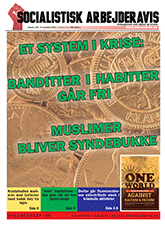Tema: Anarkisme/autonomi
- Anarkisme/autonomi
- Robin Burrett: “How many ways to get what you want?”
International Socialism Journal nr. 133, jan 12 – side 218
Note: John Molyneux, Anarchism: A Marxist Criticism (Bookmarks, 2011), £4
- Paul Blackledge: Feedback: Anarchism, syndicalism and strategy: A reply to Lucien van der Walt
International Socialism Journal nr. 131, jul 11 – side 189
Note: Lucien van der Walt’s reply to my “Marxism and Anarchism” marks a welcome step forward beyond the all too familiar “non-debate” between Marxist and anarchist tendencies on the revolutionary left.
- Lucien van der Walt: Feedback: Counterpower, participatory democracy, revolutionary defence: debating Black Flame, revolutionary anarchism and historical Marxism
International Socialism Journal nr. 130, apr 11 – side 193
Note: This article responds to criticisms of the broad anarchist tradition in International Socialism, an International Socialist Tendency (IST) journal. I will discuss topics such as the use of sources, defending revolutions and freedom, the Spanish anarchists, anarchism and democracy, the historical role of Marxism, and the Russian Revolution.
- Ian Birchall: Feedback: Another side of anarchism
International Socialism Journal nr. 127, jul 10 – side 175
Note: Paul Blackledge’s article “Marxism and anarchism” is a most useful contribution. It provides a sound exposition of the fundamental differences between Marxism and anarchism; it is based on careful and thorough documentation and is argued in a sober and unsectarian tone. Yet at times the article only tells half the story.
- Leo Zeilig: Book review: Contesting the revolutionary tradition
International Socialism Journal nr. 127, jul 10 – side 220
Note: Michael Schmidt and Lucien van der Walt, Black Flame: The Revolutionary Class Politics of Anarchism and Syndicalism (AK Press, 2009), £18
Black Flame is the first of a two-volume project that attempts to re-examine the history and theory of “anarchism’s democratic class politics” over the last 150 years. Its scope is wide. The two volumes aim to cover the emergence of 19th century anarchism, the anti-capitalist movements at the start of this century, and the intellectual history of the tradition.
- Joseph Choonara: Empire built on shifting sand
International Socialism Journal nr. 109, dec 05 – side 143
Note: The last few years have not been kind to Antonio Negri. Empire, his most famous book, produced in collaboration with Michael Hardt, heralded the death of imperialism.
Artiklen er oversat til dansk og kan læses på Marxisme Online: Imperiet bygget på flyvesand.
- Martin B. Johansen: Michael Hardt og Toni Negri: "Imperiet": Manifest for det 21. århundrede?
Socialistisk Arbejderavis nr. 221, nov 03 – side 9
Note: Michael Hardt og Toni Negris bog "Empire" er i oktober udkommet på dansk. Da bogen kom frem for tre år siden, blev den betegnet som "nutidens Kommunistiske Manifest". Men kan disse værker sammenlignes? Hvilken betydning har bogen "Empire" haft for den antikapitalistiske bevægelse?
- Alex Callinicos: Toni Negri in perspective
International Socialism Journal nr. 92, sep 01 – side 33
Note: Alex Callinicos develops a critique of Toni Negri, the theorist of autonomism and the figure to whom many of the Black Bloc anarchists look for inspiration. He argues that Negri's theory is an impoverished body of ideas as incapable of providing intellectual guidance to the new movement as the Black Bloc is of providing practical guidance.
- Jack Fuller: The new workerism: The politics of the Italian autonomists (Reprint ISJ 2:8, Spring 1980)
International Socialism Journal nr. 92, sep 01 – side 63
Note: Jack Fuller's dissection of the previous phase of autonomist activity was first published in International Socialism in the spring of 1980. We reproduce it here since none of the warnings that it issues about the illusions of autonomism have lost their relevance.
- Andy Durgan: Revolutionary Anarchism in Spain: the CNT 1911-37
International Socialism Journal nr. 11, dec 80 – side 93
Note: The origins of Spanish anarchism lie in the birth pangs of a locally weak capitalism and the waves of rural revolt which swept the peninsular in the second half of the nineteenth century. The complex reasons why anarchism should take root so firmly in Spain have been discussed elsewhere. Suffice to say that the peculiar social, economic and political situation in nineteenth century Spain did not bode well for normal trade union practices, particularly in the countryside. Anarchist ideas fitted many of the traditions of Spanish workers, e.g. federalism, and their influence spread partly because they became available in the key formative years of the workers’ movement.
Der blev fundet 10 artikler
Til hovedgruppe – Til temaoversigt
- Leder: Det mener vi
- Interview: Kampen mod umenneskelige fængslinger af afviste asylansøgere nytter noget
- Udenlandske chauffører har usle vilkår i Danmark
- “Grøn” kapitalisme – kun grøn, når der kan tjenes penge
- Derfor går finansverdenens nålestribede amok i kriminelle aktiviteter
- 1968: Året der forandrede alting
- Mere end en Saudi PR-katastrofe
- To år med Trump har mobiliseret millioner til modstand
- Almindelige menneskers historie: 3. De første store stater og de første klassekampe



 Newsfeed
Newsfeed